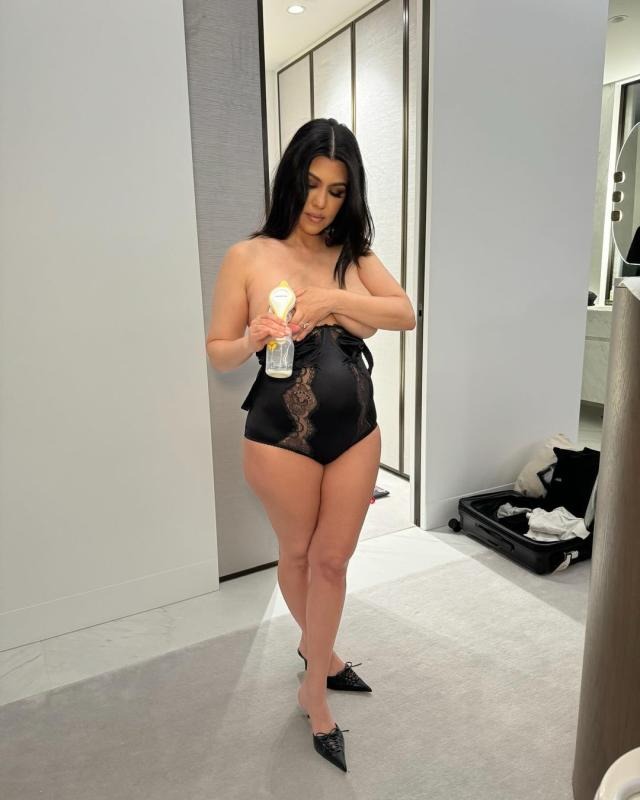Kourtney Kardashian Barker may have been in a self-described “baby bubble” since giving birth to her son Rocky Barker in November of last year, but it has not shielded her from the cultural craze surrounding Ozempic and other GLP-1 prescriptions. Today Kardashian Barker’s wellness brand Lemme—which she launched with gummy vitamins and supplements two years ago—is selling an over-the-counter, plant-based supplement named GLP-1 Daily. GLP-1 Daily is different from, for example, Ozempic in that it is available to anybody without a prescription or doctor’s consultation and that it is marketed as a natural alternative, containing three key plant extracts.
According to a recent poll, one in eight American adults report that they have used a glucagon-like peptide-1 agonist medication—also known as a GLP-1 drug—including semaglutide drugs like Ozempic or Wegovy and tirzepatide medications such as Zepbound or Mounjaro.
“GLP-1 is a hormone naturally produced in your intestines, and it plays a crucial role in regulating blood sugar levels and appeтιтe,” says Dr. Rekha Kumar, an endocrinologist and chief medical officer of the weight management company Found. “While your body naturally produces GLP-1, some people may benefit from medications that mimic its effects.” In that case, a prescription is administered. (Typically people are diagnosed with type 2 diabetes.) Such medications have been scientifically proven to help with weight loss, glucose control, and inflammation—and are currently being studied for additional benefits. Dr. Kumar refers to GLP-1 prescriptions as “one of the greatest medical breakthroughs of the decade.”
They have sparked a social phenomenon, too. “If you told me when I launched the brand that this would be a product we were making, I wouldn’t believe you,” Kardashian Barker tells me over Zoom. “But GLP-1 medications have been helpful to so many people. The drug clearly has so many benefits, but it also has a lot of side effects.” It was a combination of those side effects (extreme nausea and GI issues being the biggest complaints) that led people to DM Kardashian Barker requesting an alternative, which motivated her and her team to search for something with less extreme side effects.
“I hear from so many patients in my practice each day who have taken a GLP-1 medication that they are really looking for natural alternatives without side effects,” says Dr. Kathleen Valenton, who is both Kardashian Barker’s personal doctor and on Lemme’s medical advisory board. The brand’s medical team developed a formula focused on three key plant-based ingredients: Eriomin lemon fruit extract, Supresa saffron extract, and Morosil red orange fruit extract.
Vogue asked Dr. Kumar and Dr. Caroline Messer of Fifth Avenue Endocrinology to ᴀssess GLP-1 Daily. (The doctors were not given any indication of what company produced the new supplement, and both prescribe conventional weight loss drugs regularly.) Both Dr. Kumar and Dr. Messer are skeptical that the compounds could have the same effects as the synthetic versions. According to Dr. Messer, these compounds—specifically Eriomin lemon fruit extract and Morosil red orange fruit extract—have been examined in double-blind, randomized studies and have been shown to either affect GLP-1 pathways or simulate the effects of GLP-1. But they have not been studied collectively or at length.
Eriomin lemon fruit extract has been shown to help control hypoglycemia and decrease inflammation, and Morosil red orange fruit extract is said to help with weight loss, though the reported average in one study came in at roughly eight pounds in six months, a smaller amount than that typically lost by patients who take a prescription version. “It’s critical to note that while some plant compounds may indirectly influence GLP-1 pathways or mimic some GLP-1 effects, they are not equivalent to pharmaceutical GLP-1 receptor agonists,” Dr. Kumar says, adding that healthy fats like wild salmon or avocado and soluble fiber can do the same thing. “We’d need more research—with women and underrepresented groups included—to fully understand the efficacy and safety of these ingredients.” (It should be noted Vogue has covered another “natural” compound that has been called Ozempic-like in the past: berberine.)
Dr. Valenton is also quick to highlight differences between the injectable GLP-1 drugs (Ozempic, Wegovy, etc.) and an over-the-counter supplement like Daily GLP-1. “Firstly, they’re two different classes of products,” she says. “Both increase the GLP-1 hormone in the body, but a GLP-1 medication is using a synthetic GLP-1 hormone to increase your levels. Although incredibly effective, many patients experience side effects and look for a more sustainable and natural solution. In comparison, Lemme GLP-1 Daily is a supplement that helps your body naturally boost its GLP-1. It also helps you burn fat instead of muscle, which we know is a common side effect of GLP-1 medications.”
Of course, we cannot talk about Ozempic and similar products without talking about the serious effect these drugs have on body positivity and mental health. “For me, this product was never just about weight loss,” Kardashian Barker tells me. “We formulated GLP-1 Daily because it allows you to regulate your glucose levels, to fight visceral fat, and to reduce inflammation. There are health benefits beyond weight loss.” Kardashian Barker adds that she hasn’t tried the supplement herself because it’s not approved for individuals who are currently breastfeeding.
Dr. Messer and Dr. Kumar are somewhat dubious of the over-the-counter GLP-1 industry in general. “The effects from these naturally occurring extracts are typically mild and likely not effective enough to treat people who are overweight or obese,” says Dr. Kumar. “They might be mildly helpful in a normal-weight person who has optimized their health otherwise.”
Dr. Valenton thinks of GLP-1 Daily a bit differently—it can also be used as a bridge product for those who are going off their prescription medication but still want support, she says. But for Kardashian Barker, the supplement is a step in the direction of democratizing treatments that are both incredibly expensive and widely unavailable across the United States.